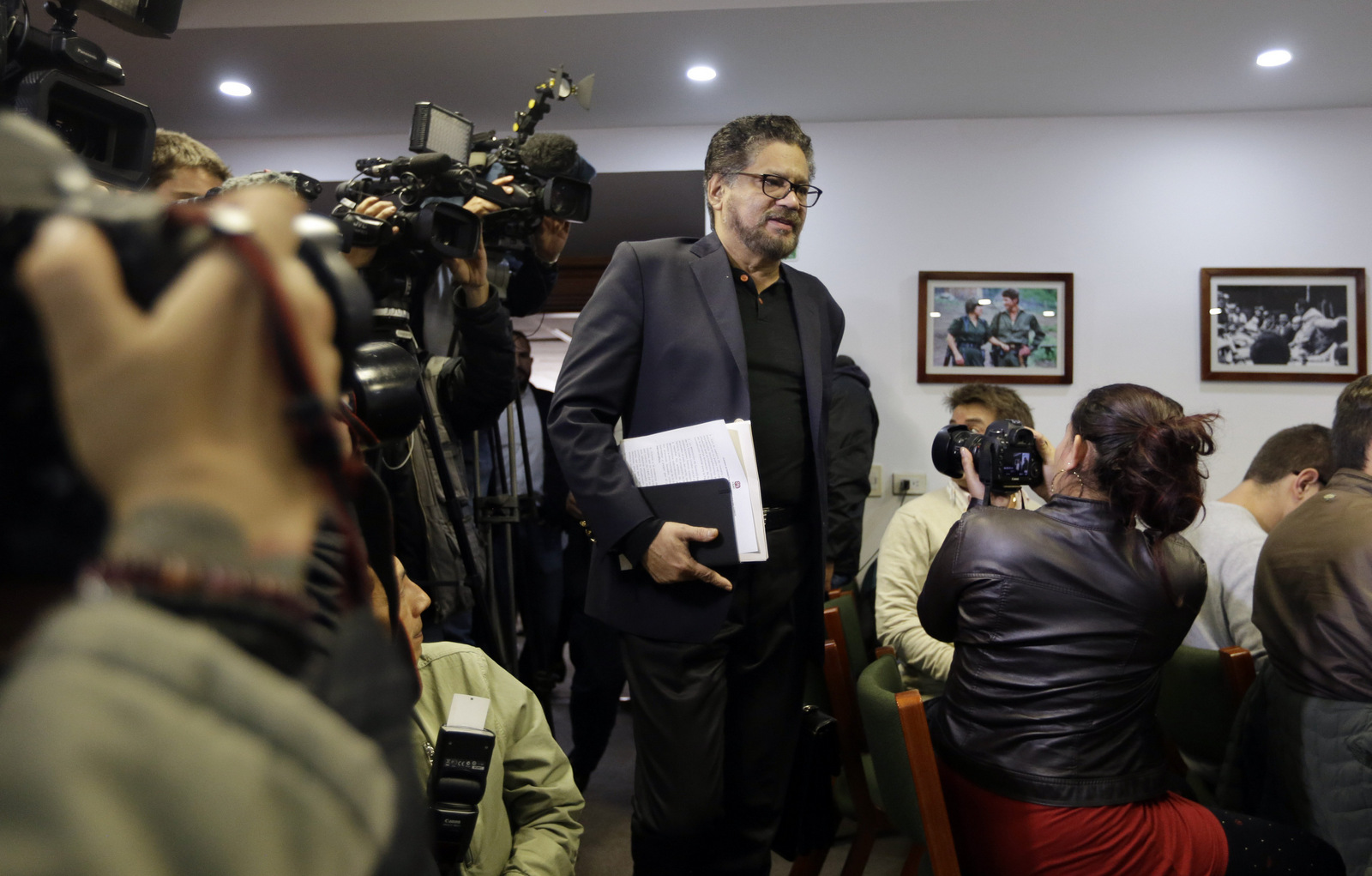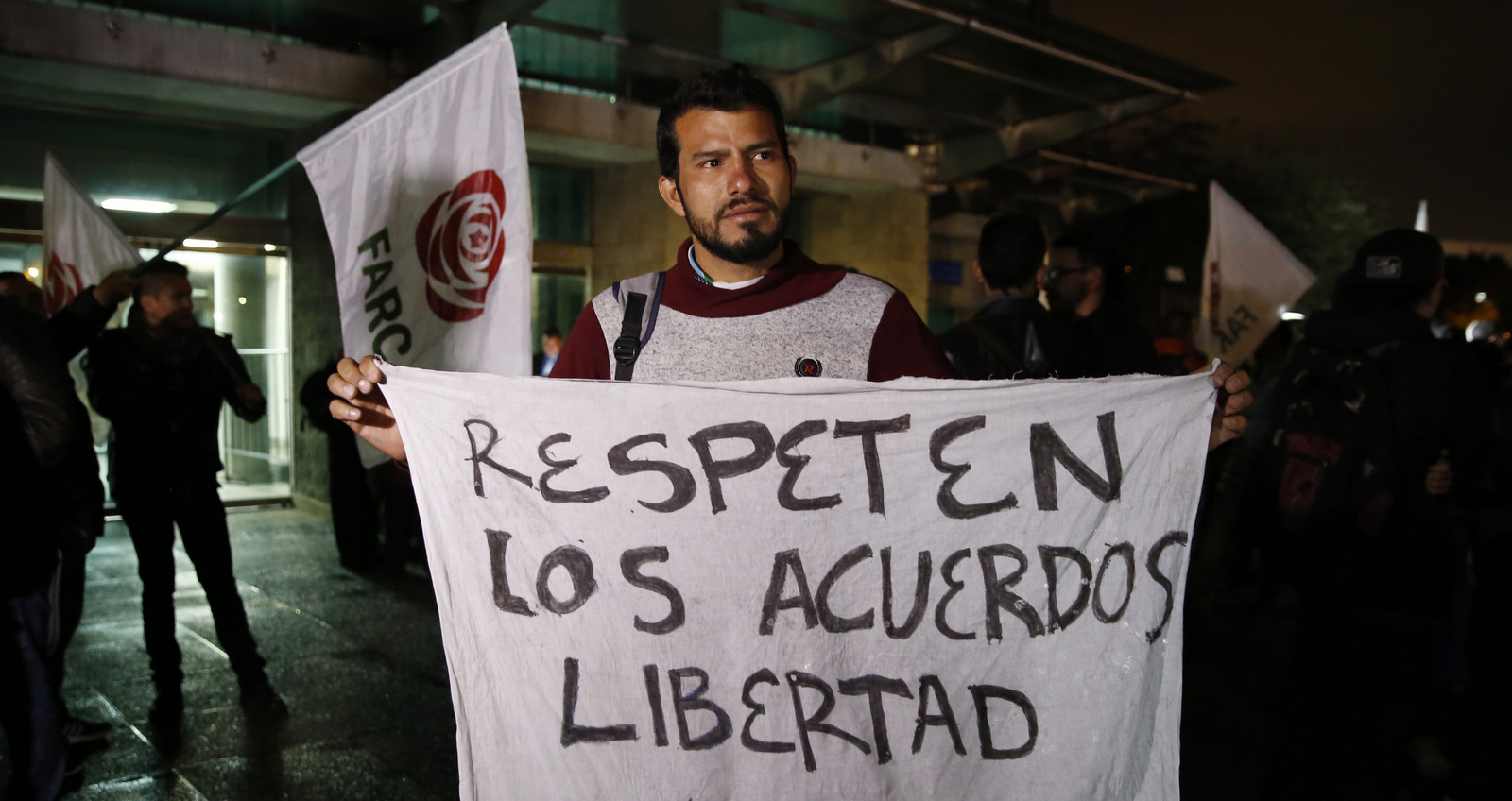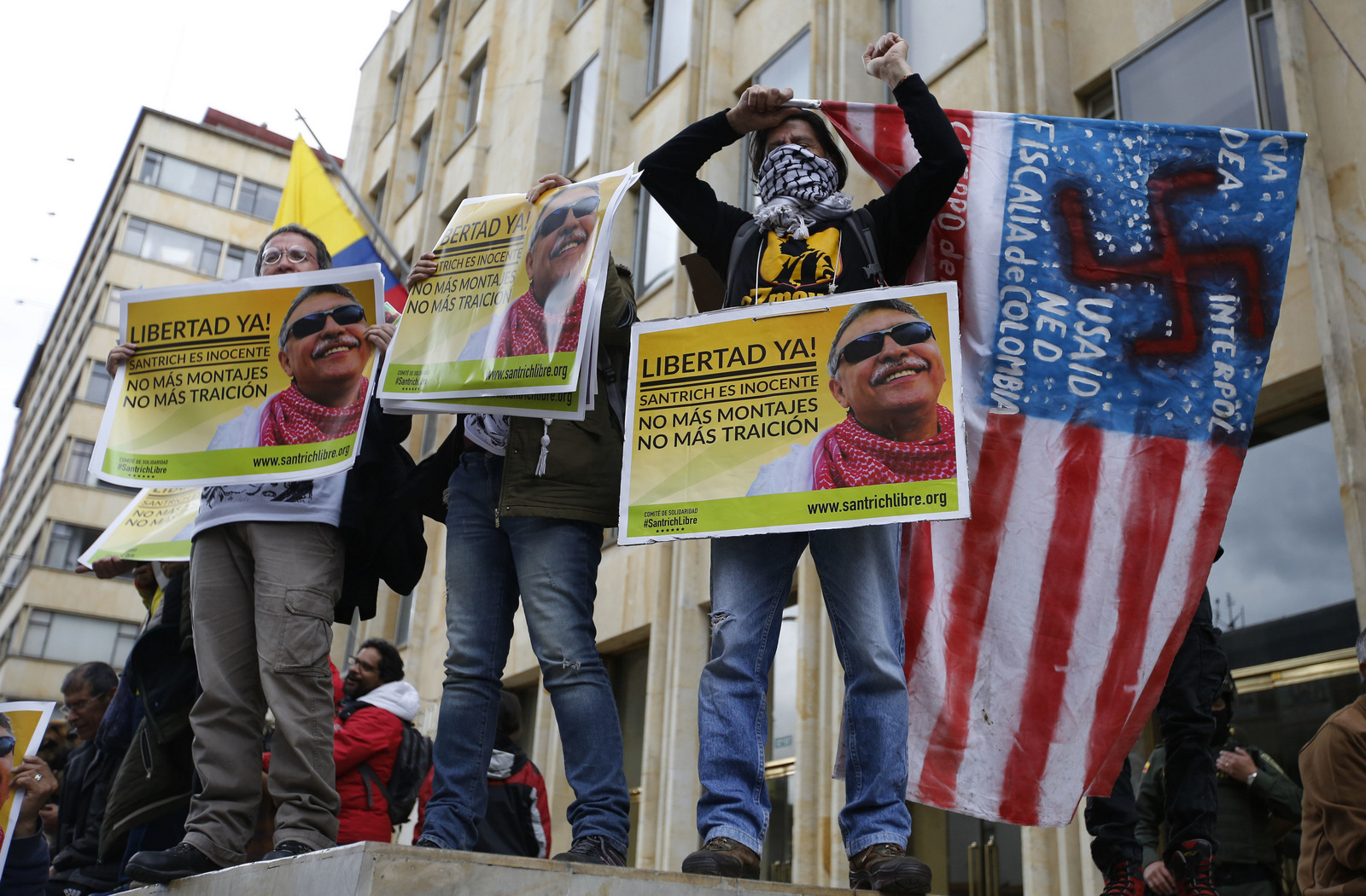Former FARC leader Jesús Santrich has been conducting a hunger strike since his arrest on April 9. His looming death ought to be big news in the United States whose government has responsibility for his fate. The U.S. State Department and DEA personnel did the groundwork in Colombia in manufacturing a case against him. The Southern New York District Court is requesting his extradition on a charge of drug-trafficking. Santrich won’t be judged in Colombia.
Santrich’s case deserves continuing attention especially because his arrest and threatened extradition portend the return of civil war to Colombia. (See our earlier report here.)
Legislators, FARC comrades, the top UN representative in Colombia, and former Uruguayan President “Pepe” Mujica begged Santrich to end his hunger strike. This is his “last battle,” he replied. On April 26 prison authorities transferred a weakened Santrich from Bogota’s La Picota prison to a hospital. On May 10 they moved him to a Catholic Church facility for “humanitarian” reasons.”

Ivan Marquez, a former leader of the Revolutionary Armed Forces of Colombia, FARC, arrives for a press conference following the arrest of Jesus Santrich in Bogota, Colombia, April 10, 2018. (AP/Fernando Vergara)
FARC leader Iván Márquez, the insurgency’s top negotiator during four years of talks leading to the 2016 peace agreement, told reporters that Santrich’s death would mean the“death of the peace process.” The United States reportedly is looking to extradite Márquez and other members of the former FARC Secretariat.
Prosecutors in New York accuse Santrich of conspiring to sell cocaine to a Mexican cartel for shipment later to New York. The charge is preposterous, says academician Renan Vega Cantor. He denounced so-called “preventative justice;” no crime had been committed. Three others arrested with Santrich weren’t FARC members: one is a paid informant and another is a DEA agent. Neither images of Santrich in the presence of the latter, nor an alleged contact with a Mexican drug impresario, prove much, says Vega Cantor.
He asks: “Where in Bogotá, in a middle-class district and surrounded by dozens of police, secret agents, and informers is a blind person [like Santrich] going to be able to process ten tons of cocaine?” He condemns the Colombian state’s “servile submission to the … the worst of the worst: big national capitalists.”
And “DEA agents move around in Colombia with no restrictions as if our country were part of U.S. territory.” He claims the Colombian government “jumped to execute the arrest and validate supposed evidence heading to that court in the United States.”
Commenting on a letter he received from Santrich, political analyst Narciso Isa Conde condemns “a terrorist state that accepts U.S. intervention and instruction.” Indeed, the U.S. government has long intruded in ongoing Colombian conflict that, based on social class divisions, has shaped political life there. Ever since Colombia’s independence from Spain a strong landowning class, joined later by commercial and financial interests, has oppressed a mostly rural underclass. They’ve relied on military force and terror.
Colombia has been a U.S. ally in the latter’s’ efforts to control the region and is a venue for exploitation by U.S. corporations and financiers. U.S. advisors in 1962, two years before the FARC was formed, urged Colombia’s government to utilize paramilitaries for suppressing rural uprisings. The U.S. Army has trained thousands of Colombian military officers at its School of the Americas. From 2002 on, billions of dollars in U.S. military aid flowed to Colombia.
That a Marxist-oriented insurgency – the FARC – did extend guerrilla operations throughout the country must have steeled U.S. resolve to keep Colombia from becoming another Cuba. In recent decades the United States evoked war against drugs as cover for its intervention against leftist guerrillas.
Terror, with U.S. complicity, was manifest in hundreds of thousands of lives lost and in immense suffering. Presently the example of Santrich probably terrifies demobilized FARC leaders thinking about possible extradition and long stays in U.S. jails. Santrich’s former FARC comrade Simon Trinidad, incarcerated in Colorado, is already an object lesson.

A supporter of former FARC rebel Jesus Santrich holds a sign that reads in Spanish “Respect the freedom agreements” during a protest against his arrest outside the Attorney General Office where he is being held in Bogota, Colombia, Monday, April, 9, 2018. Seuxis Hernandez, a blind rebel ideologue best known by his alias Jesus Santrich, was picked up Monday at his residence in Bogota on charges that he conspired with three others to smuggle several tons of cocaine into the U.S. with a wholesale value of $15 million. (AP/Fernando Vergara)
In persecuting Santrich, the U.S. government saps away at the peace process. It demonstrates an easy tolerance for the government’s non-compliance with an accord providing for: agrarian reform, support for legal crops, political participation by former guerrillas, physical protection for them, and freedom for hundreds of imprisoned FARC combatants. There’s been little by way of implementation. Dozens of former insurgents have been killed.
A recent report from various human rights groups testifies to terror and political repression at the hands of paramilitaries, to which both governments turn a blind eye. The report indicates that, “during early 2017 paramilitary groups were active in 274 municipalities of 28 departments. The ‘new’ paramilitaries exercise territorial control, pursue human rights defenders and social leaders, maintain counterinsurgent language and practices, control local markets, and have access to illegal income … It’s clear they have ties to the armed forces of the state.”
Within FARC counsels, Santrich had objected to the giving up of arms as a condition for a peace. His dissent evidently reflected division among leadership elements of the former insurgency that continues. Some, it is said, are all too willing to latch onto the Colombian government’s neo-liberal aspirations while others say they’ve returned to “the mountains” to resume military action.
It’s a context in which some of Santrich’s former comrades, intent upon ingratiating themselves with the oppressors, may be unmoved by the disappearance of someone like Santrich, dedicated to the end to the FARC’s revolutionary purposes.
Narciso Isa Conde had met and conferred with FARC leaders, including Santrich, while the insurgency was active. Santrich’s aforementioned farewell letter to him begins: “My friend, dear comrade, I can’t leave without expressing gratitude to you for so much solidarity.” The letter expresses his determination “to avoid our falling into the swamp in which we find ourselves, but surely, as is well known, much is lacking, a great deal, for defending the work of Manuel, of Jacobo, and all the others who delivered their lives for the project of a new Colombia. But I do expect that all that we have sown has to germinate some day from the fertile soil of sacrifices and with the collective hands of dignity.” (1)
Note
(1) Prior to his death in 2008 Manuel Marulanda was the FARC’s principal leader. Jacobo Arenas, representing Colombia’s Communist Party, served as ideological leader within the insurgency. He died in 1990.
Top Photo | Supporters of Jesus Santrich, a leader of the former Revolutionary Armed Forces of Colombia (FARC), hold posters asking for his freedom during a demonstration marking May Day to honor workers, in Bogota, Colombia, May, 1, 2018. (AP/Fernando Vergara)
W.T. Whitney Jr. is a retired pediatrician and political journalist living in Maine.
The post America’s Role in Removing a Revolutionary and Restoring War to Colombia appeared first on MintPress News.
